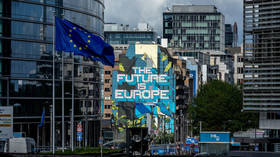Russia responds to EU sanctions
Moscow has expanded its travel ban list and vowed a “proper response” to any further unfriendly acts from Brussels, after the EU announced an expansion of unilateral restrictive measures.
In its 14th package of sanctions revealed on Monday, the EU blacklisted 69 more individuals and 47 entities, as well as the shipping of Russian liquefied natural gas (LNG) and Russia’s banking payments system.
EU actions are “illegitimate from an international legal point of view, since they are carried out bypassing the UN Security Council,” the Russian Foreign Ministry said in a statement.
The measures are “absolutely futile and only undermine the trust of Global Majority states in the EU,” the ministry added.
In response to the EU’s unfriendly steps, Moscow has “significantly expanded” the list of persons banned from entering Russian territory. Among them are members of the European Council, lawmakers of EU member countries and national delegations to the European Parliament.
According to the foreign ministry, the ban has also been extended to bodies, enterprises, and individuals responsible for providing military aid to Ukraine; people involved in attempts to prosecute Russian officials; those advocating for the confiscation of frozen Russian sovereign assets and handing them over to Ukraine; and NGO activists engaging in anti-Russian rhetoric.
The full list of EU subjects affected has yet to be made public.
Brussels has so far sanctioned over 2,200 Russian individuals and entities for alleged “actions undermining or threatening the territorial integrity, sovereignty and independence of Ukraine.”
The latest sanctions package bans the import of Russian helium and targets operations for re-exporting Russian LNG via the EU. Deliveries of LNG for use within the bloc remain unaffected, however.
The European Council has also announced a ban on the System for Transfer of Financial Messages (SPFS), Russia’s replacement for the Western-controlled SWIFT. EU sanctions have also targeted dozens of companies in China, Kazakhstan, Kyrgyzstan, Türkiye, and the UAE over their alleged supply of dual-use goods and technologies to Russia.






Comments are closed.